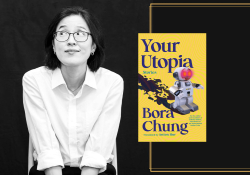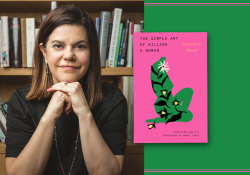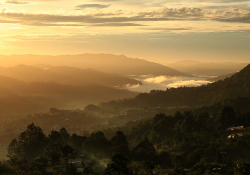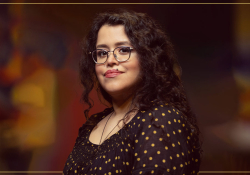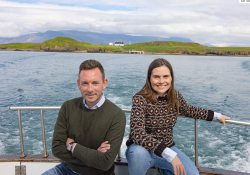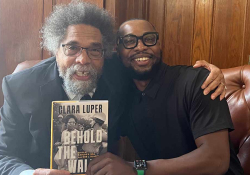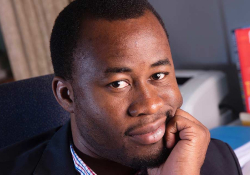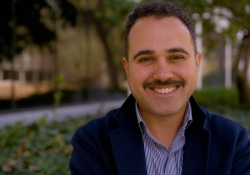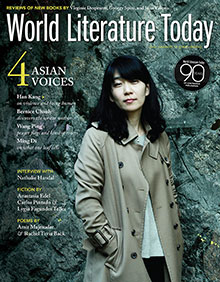Prayer Flags and Kinship Rivers: A Conversation with Wang Ping
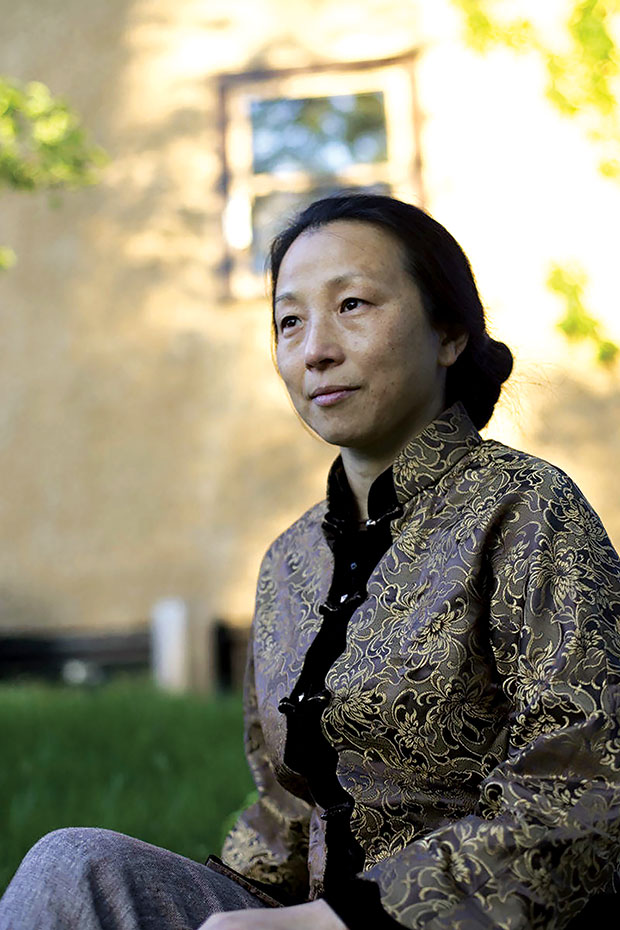
Wang Ping emigrated to the US from China in 1986 and is currently a professor of English at Macalester College. She is a writer, poet, translator, photographer, and a lover of rivers. Her Kinship of Rivers project was created for people living near the Mississippi River and the Yangzi River to make river flags, signifying a connection between the two river communities. The project soon grew, with communities from all over the world contributing river flags. Some of Wang Ping’s notable works include American Visa: Short Stories,Foreign Devil: A Novel, and The Magic Whip: Poems. Her most recent verse collection, Ten Thousand Waves, features diverse voices that discuss issues facing modern China. While her native language is Chinese, Wang Ping writes in English, making her works easily accessible to US readers. We sat down together when she visited the University of Oklahoma in October 2015 to serve on the 2016 Neustadt Prize jury. Her nominee was Ghassan Zaqtan.
Amy Lantrip: Welcome to Norman, and thank you for agreeing to this interview.
Wang Ping: Thanks for having me; I am happy to be here.
AL: The collection Ten Thousand Waves is written in English, and many of your other works are as well. Why do you choose to write in English?
WP: I do write poetry in Chinese, but now I live in America. I have been living here since 1986. So English is actually becoming almost my first language. I think and dream in English, and my audience speaks English.
AL: So would you say that your audience is mostly American?
WP: Americans or Chinese who can read English. And some of the stuff really can’t be translated into Chinese.
AL: So you think it is easier . . . more free-flowing?
WP: Yes, and some of the content is not suitable, especially when it concerns Tibet. I do talk a lot about Chinese migrant workers in Ten Thousand Waves, which concerns me a lot. I was a peasant for three years in China, and when I went back to China, I traveled along the Yangzi River. I visited villagers and factory workers who used to be farmers. So I recorded their stories and tried to bring out their voices.
AL: Yes, and some of those voices are in the poem “The Price of a Finger,” where you quote factory workers and owners about workplace safety. You also include a poster that shows how much pay a worker will lose depending on what body part they lose. What were you trying to convey with that poem?
WP: I want to tell what is going on in China. The interesting thing is, I met a Chinese poet from NYU who read the book and grew up in that city, Yongkang [the city in which “The Price of a Finger” takes place]. She grew up with all those workers, and her mother owned a few workshops like that.
AL: So she was surprised at the conditions, which she did not know about?
WP: She knew about it, but she kind of suppressed it. And [after reading the poem] everything just came back to her. She was very touched, and even wrote a book review.
AL: “The Price of a Finger” is actually one of my favorites. I first saw it in another publication, an anthology of Chinese poetry.
WP: Really? I did not know that. People use my work without letting me know, which is fine. I am so against the idea of private property in literary works. I think literature should belong to the public. Of course I am all for making a living. But at the same time, when money is involved, when you have to protect your work as a kind of private property, it is kind of against the very nature of poetry and literature. Great literature belongs to everyone, you know? It belongs to the heart and the soul. You are talking to the soul of the public.
AL: In Ten Thousand Waves, the title poem is based on a true story about Chinese immigrants who drowned in the UK. Why did their story inspire you to write a poem?
WP: I didn’t pick them; their story picked me. You know, immigrants cross borders all the time. Not just Chinese; people will always cross borders to make a better life. I wrote a poem in the 1990s about a group of Chinese people whose ship foundered in the sea near Rockaway.
AL: By New York City?
WP: Yes. A lot of people drowned. When that happened I was hanging out with Ai Weiwei. We were both very concerned with this tragedy, and we wanted to do something. The Poetry Project from St. Mark’s Church asked me to do a reading with Allen Ginsberg, the author of “Howl.” So I wanted to write a poem about those people. I heard that about twelve bodies were not claimed, so they were buried in a public cemetery in New Jersey. I wanted to visit the cemetery, and I asked a friend from New York who was a former Marine and had a car to take me there. On the way, we just kept getting lost. And you would think, this is a public place—we have the name, we have the address, that it would be very easy. But we just kept getting lost! It was almost like we were going through a maze, and we were almost there, and then this huge storm came out of nowhere. So we couldn’t drive, and we had to pull over and wait for the storm to go away. When it finally went away, the cemetery was closed. So I thought, okay, I understand that the spirits of these people don’t want me to get too close, but I am still going to write this poem. And I remember when I finished it, I used so much blood, I couldn’t see. I went blind for a day.
AL: You put so much energy into it?
WP: Right. So I read the poem alongside Allen Ginsberg. He performed “Howl,” and I performed that poem. It was really intense. Then a magazine published the poem, and it was selected by Adrienne Rich for the Best American Poetry anthology of 1996. And then ten years later, I was invited to the University of Pittsburgh, and in the audience was a British filmmaker, Isaac Julien. For some reason, I chose to read that poem—I hadn’t read it for ten years. But that day I chose to read the poem. After that, he came up to me and said, “You need to come to England to go to Morecambe Bay. I am making a film about the tragedy.”
AL: The 2004 incident with Chinese immigrants from the poem “Ten Thousand Waves”?
WP: Yes, the cockle pickers who died there. So I went there, and he commissioned me to write a poem for his film. It took me almost two years to write the poem, because for all twenty-one people, I wanted to give each a voice. I traveled to China and visited their hometowns.
AL: Yes, each person in the poem has a personality. I felt I knew them just by that little bit.
WP: Yes, so I really believe that those people picked me to write this poem. When I was writing it, I just knew that their spirits were passing through me. I feel very honored to be chosen by them.
AL: Speaking of the spiritual, you have called Tibet your “spiritual home.” What about Tibet inspires you?
WP: Well . . . I really feel that I was a Tibetan many times in previous lives. When I first stepped on the land, I just felt really at home. All of my life I feel I am a gypsy.
I really feel that I was a Tibetan many times in previous lives. When I first stepped on the land, I just felt really at home. All of my life I feel I am a gypsy.
AL: Wandering around like a nomad?
WP: Yes, like a nomad. I felt really at home in Tibet. I really like the teachings of the Dalai Lama. The compassion and being kind, how the body and the mind are temples.
AL: You also talk a lot about the environment of Tibet.
WP: Yes, the land; it is so hard to describe the land. I really think it is a sacred land. It is just so high up, and carries so much weight. It is so barren and yet so rich at the same time. It really forces you to strip everything. We are so weighted down by all the decor and masks that are so unnecessary, and we don’t know it. We think everything becomes so important, but in reality most of the things we feel attached to are not necessary. I don’t think anyone can feel untouched when they are in Tibet. There is something there, and that is why I urge people to go there.
AL: That sounds like a nice commercial for tourism.
WP: (laughs) Well, I never travel for tourism; I always travel with a purpose.
AL: Let’s talk about water and the Kinship of Rivers project. Why is water so prevalent in your writing, and how does that connect with the Kinship of Rivers?
WP: Well, we are water. Seventy-five percent or so of us is water, right? I was born in Shanghai, which is the end of the Yangzi River. Tibet, my spiritual home, is the source of that river and many major Asian rivers. Now I live on the bank of the Mississippi River, and I teach my students about rivers. One year I went to Tibet to do a small art project. We had six artists, and we made a little piece of fabric art and then sewed them together. The person who was in charge asked me to bring it to the Great Wall of China. Instead, I wanted to take it down the Yangzi River. We wanted to make two, one at the end and one at the beginning of the river. So he agreed to that. I hired a guy to take me to a high mountain, which is about five thousand meters.
AL: What is the name of the mountain?
WP: It is called Mila Mountain. Up there the air is very thin, and I was struggling to tie the flags among the millions of Tibetan prayer flags, and I wanted to add the small banner to the other flags. I knew the flags were there, but I did not know the magnitude. I was stumbling and gasping, trying to tie it. When I finally did it, I stepped back. The banner was small and insignificant, but when it joined the prayer flags, suddenly it became a great force. And I thought, wow, I am going to do something with this. I am going to travel along the Yangzi and the Mississippi and get people together to make prayer flags. I want the two rivers to become sister rivers.
AL: Through the prayer flags?
WP: Yes, and I also want there to be an exchange of culture. Poetry, music, art, food, theater. China and America.
When you think about it, all of the water wants to go to the rivers, and all of the rivers want to go to the ocean. So we are really just one body of water.
AL: So it is a symbolic gesture for the two rivers, two countries, two peoples.
WP: Yes, two continents. So they will just join. And I want to have some kind of bloodline. When you think about it, all of the water wants to go to the rivers, and all of the rivers want to go to the ocean. So we are really just one body of water. We are all connected through rivers and through water. I tried to come up with a good title for the project. I thought maybe “bridges” or all kinds of things, and nothing came to me. Then one night it came to me through a dream: “Kinship of Rivers.” All good titles come to me through dreams. “Kinship of Rivers.”
AL: I like it because it suggests not only China and America but the world, because rivers are everywhere.
WP: Yes, and I want to extend it to all rivers. I have included many rivers in America and Canada; we have gone to the Ganges and Amazon. I am going to the Amazon again soon. And I am going to the Po River in Italy. I will take all of the 2,500 flags to Everest again. I took them to the north face of the mountain in 2013, but the security was so tight. They only opened it up for three minutes, so I recorded. We were going to go last year, but a week before our departure the earthquake happened. But we are scheduled to go in May 2016. This is amazing, because when I first thought of this project I thought that I would love to have the Dalai Lama bless it and bless the flags. Everyone said, “Oh, you are crazy!”
AL: Yes, I would think it would be hard to get through to him.
WP: Yes, but guess what? Last year, His Holiness met with me privately and blessed all the prayer flags. He met with me in my most difficult period. And he received me . . . when I entered the room he grabbed my hand and put it to his heart and talked to me like that. And he held my book and we took a picture. Isn’t that amazing?
AL: Yes, so amazing, and nowadays you have to take a picture or else no one will believe you.
WP: (laughs)
AL: Well, perhaps we should leave it there, I don’t think we can say anything better after talking about the Dalai Lama.
WP: Yes. And after that everything got so much better. Thank you for having me; it was great to be here.
October 2015

